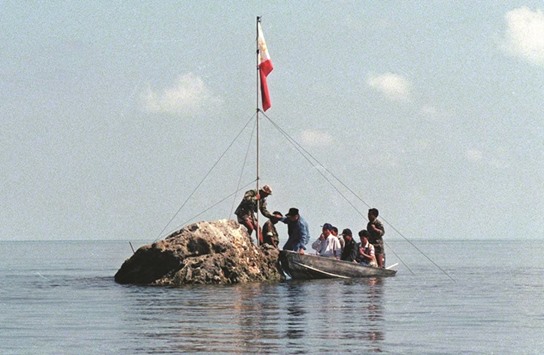China reacted furiously to the verdict by a UN-back tribunal on Tuesday, insisting it will ignore the decision while warning its rivals too much pressure on the issue could turn the resource-rich and strategically vital waterway into a “cradle of war”.
The Philippines, which launched the legal challenge, had initially refrained from asking China to abide by the ruling.
This followed President Rodrigo Duterte’s directive to achieve a “soft landing” with the Philippines’ much more powerful Asian neighbour.
But Manila hardened its stance yesterday with a statement detailing foreign secretary Perfecto Yasay’s priorities when he attends an Asia-Europe summit, known as ASEM, in Mongolia this week along with Chinese Premier Li Keqiang.
“Secretary Yasay will discuss within the context of ASEM’s agenda the Philippines’ peaceful and rules-based approach on the South China Sea and the need for parties to respect the recent decision,” the foreign affairs department said in a statement.
Even just raising the issue at the two-day summit starting today will anger China, which has long bridled at Philippine efforts to have the dispute discussed at multilateral events.
Chinese assistant foreign minister Kong Xuanyou insisted on Monday the ASEM summit was “not an appropriate venue” to discuss the South China Sea.
But China appears to be in the minority — Japanese Prime Minister Shinzo Abe also said yesterday as he left for Mongolia that he wanted to discuss the South China Sea at the summit.
China claims nearly all of the sea — which is of immense military importance and through which about $5tn worth of shipping trade passes annually — even waters approaching the coasts of the Philippines and other Southeast Asian nations.
China justifies its claims by saying it was the first to have discovered, named and exploited the sea, and outlines its territory using a vague map made up of nine dashes that emerged in the 1940s.
However the tribunal, in The Hague, ruled China’s claimed historic rights to resources within the nine-dash map had no legal basis.
It also declared that China had acted unlawfully by violating the Philippines’ sovereign rights within its exclusive economic zone — waters extending 200 nautical miles from the Filipino coast.
China had done so by interfering with Philippine fishing and petroleum exploration within the exclusive zone, as well as by building artificial islands there.
The Philippines filed the legal challenge against China in 2013 under Duterte’s predecessor, Benigno Aquino.
Relations between Beijing and Manila plummeted over the row.
Duterte, who took office on June 30, has said he wants better relations with China and to attract Chinese investment for major infrastructure projects.
Unlike Aquino, Duterte has said he wants to talk directly with China over the issue.
Beijing also wants to negotiate, but at the same time insists it will never concede on sovereignty.
President Rodrigo Duterte believes that now is the best time to hold bilateral talks with China since an international arbitral tribunal has issued its ruling on a case filed by the Philippines against Beijing, according to budget secretary Benjamin Diokno.
“President Duterte said, we’ll start the bilateral talks and now we’re starting from a better position because of that decision,” Diokno said yesterday.
He added that Duterte informed his cabinet during Tuesday’s meeting that the Philippine government is willing to negotiate with China.
Also, Diokno said, the president told them to be “magnanimous in victory”.
“Your rival is angry, there’s no need to anger him more. The only problem with the decision is the enforceability,” the budget chief quoted the president as saying.
Justice secretary Vitaliano Aguirre 2nd confirmed that the holding of bilateral talks was tackled by the cabinet.
“That was when we were discussing the different responses or options which the Philippines may take after the ruling was issued. We have to talk with China. We could not avoid it,” Aguirre said.
Duterte met with his cabinet officials in Malacanang an hour after the UN international tribunal released its ruling on the case.
Duterte earlier said he intends to continue backing multilateral efforts– including Asean’s own initiatives–to settle disputes with China.
The Association of Southeast Asian Nations (Asean) will not issue a statement on the rejection of Chinese territorial claims in the South China Sea by the UN tribunal, regional diplomats said also yesterday, blaming the no-comment on pressure by Beijing.
The Asean had weighed whether to speak out on the ruling, southeast Asian diplomats with knowledge of the matter said.
But the 10-member regional bloc, whose unity has increasingly come under strain in the shadow of Beijing’s expanding presence in the South China Sea, could not find common ground on the highly sensitive issue involving its massive and powerful neighbour, the diplomats added.
Foreign secretary Perfecto Yasay Jr also yesterday said he will work for Asean to come up with a unified statement on the matter.
“We already have the full support of many of the international community members. But it will also be important for the Asean to have a unified statement,” Yasay added in an interview.
He is in Mongolia for the 11th Asia-Europe Meeting (Asem), representing Duterte in the summit that gathers 53 leaders from Asia and Europe.

